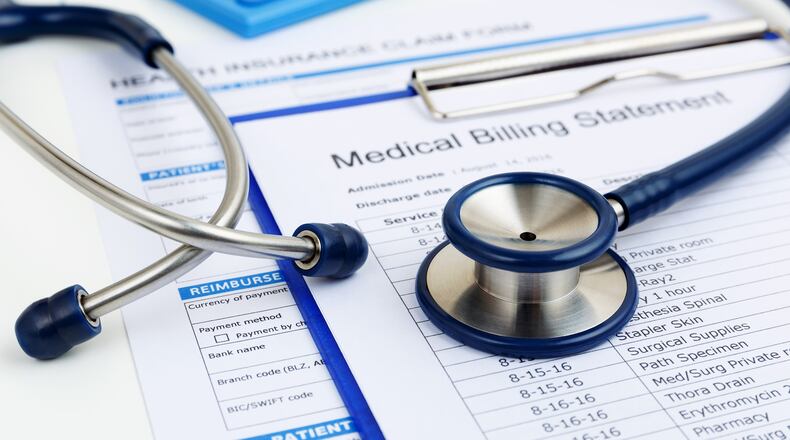Financial ruin leading to loss of homes and bankruptcy. Poor health outcomes due to stress and lack of access to medical care. The cause? Medical debt - an issue that continues to burden metro Atlanta families.
In the past five years, more than half of U.S. adults report they’ve gone into debt because of medical or dental bills, according to a 2022 poll conducted by the Kaiser Family Foundation. About 1 in 7 people said they’ve been denied access to a hospital, doctor or other provider because of their unpaid bills and about two-thirds have put off care they or a family member needed because of cost.
Here in Atlanta, medical debt increasingly is a challenge and those in disadvantaged communities are hit harder than most. In 2022, the Urban Institute estimated that 14.5 percent of people living in Fulton and DeKalb counties alone were carrying medical debt in collections, amounting to more than $181 million dollars being owed. The Atlanta Regional Collaborative for Health Improvement recently partnered with RIP Medical Debt to explore the effects of medical debt on the lives of people living in our city through focus groups in which they shared their experiences.
Credit: contributed
Credit: contributed
So, what did we learn from our research?
First, Atlantans are still struggling with the fallout from the pandemic. Health challenges add more strain, and now inflation and rising prices intensify financial pressure Atlantans face. Second, many people told us that having health coverage did not protect them from bills they couldn’t afford to pay, and they believe hospitals, providers and insurance companies find loopholes in order to send large and unexpected medical bills.
These perceptions are important for providers to reckon with, even though many strive to provide access to care that Atlantans can afford. These patients’ perceptions hold true with recent NPR/Kaiser Health News reporting that analyzes credit reporting data with health claims data. The report found that the number one predictor for acquiring medical debt isn’t being uninsured; it’s getting sick. The shocking reality of our healthcare system today is that there is a disconnect between coverage, cost and affordability, and patients are feeling that pinch at the doctor’s office and in the hospital.
Many in our focus groups said they feel powerless - caught in a cycle they can’t escape. It is impossible to know how much care will cost beforehand because prices are not clear or discussed before treatment. They feel the system is driven by greed and is lacking humanity. And even those who questioned bills and tried to get them dismissed or reduced said the process was confusing, overwhelming and time-consuming.
Medical debt harms people emotionally, financially and puts their health at risk. In fact, the fear of medical debt itself is often a barrier for people in need of preventative and immediate medical care, thus causing more costly medical issues and perpetuating chronic issues to develop.
Understanding of the significant impact of medical debt on cities has led to bipartisan support for medical debt relief, extending across the country and across the political spectrum. Recent findings by Tulchin Research reveal 71 percent of respondents supported medical debt relief, compared to just 50 percent that supported student loan debt relief. The same research showed more than 81 percent agree with the statement “medical debt is different from other types of debt that people choose to take on because no one chooses to have an unexpected illness or injury.” Three-quarters agreed that “medical debt in the United States is a crisis” and that “many families are being crushed by medical debt due to no fault of their own.”
RIP Medical Debt offers one solution to provide much-needed relief to U.S. residents, including many in Georgia. Since its founding in 2014, RIP Medical Debt has acquired — and abolished — more than $8.5 billion of medical debt, helping more than 5 million families. In Clayton, Cobb, DeKalb, Fulton and Gwinnett counties, it has abolished more than $252 million in debt and that number jumps to more than $505 million for the entire state.
In recent years, the organization has placed an emphasis on buying debt directly from hospitals and health systems, before it even reaches collectors. And while many providers refuse to sell accounts to collectors, RIP Medical Debt has found that many people are haunted by unpaid, past-due medical debt even when it is not on a credit report and the bills no longer come. For these reasons, it’s encouraging to see more health systems, thought leaders and elected officials recognize medical debt as a social determinant of health and debt relief as a way to support their communities.
While wiping medical debt provides immediate benefits, it does not address the root causes of the problem, such as high healthcare costs and limited access to good health insurance.
To effectively address these issues, we need to build a system of care that meets people where they are and improves the region’s health. One that does not create the burden of debt and in which all people are adequately insured and healthcare services are accessible in ways patients and providers can count on. We must “invert the burden” and offer more services and support delivery through a cohesive, person-centered system of care, rather than making individuals navigate the system alone.
Jeffrey M. Smythe is executive director of the Atlanta Regional Collaborative for Health Improvement (ARCHI), a coalition of public, private and nonprofit organizations committed to improving the region’s health. He and his team focus on those who are marginalized, isolated, living in poverty and/or suffering from health inequities in metro Atlanta.
About the Author
Keep Reading
The Latest
Featured




